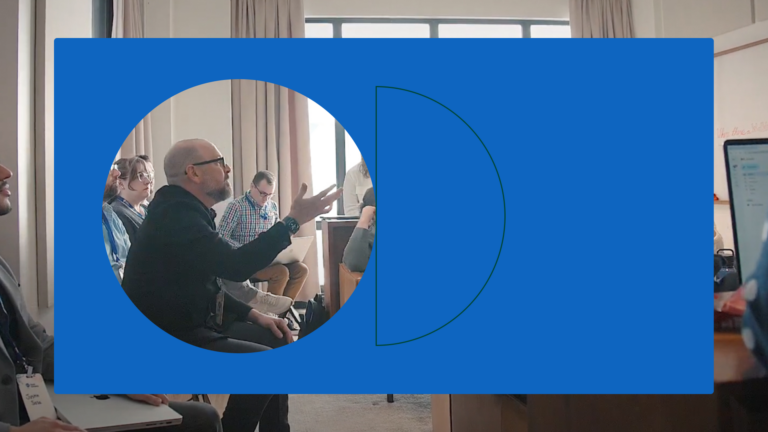I Talk Behind Your Back

Recently (but I won’t say how recently, to protect the innocent), I found myself in that awkward situation of overhearing someone talking about me.
In this case, they were curtly critiquing something I had done, talking about how it made them feel… which gave me some helpful perspective (I didn’t disagree with the critique, incidentally). I’m certain they would have at least reined it in had I been in the room, but more than likely they would have never brought it up to my face. Because they never did. And therein lies the problem.
When I relayed the story to Phil Charron, he very simply said “everyone talks about everyone else behind their back. Period.” He was very matter-of-fact about it, and I was surprised at how disarming it was to just say that out loud. We all know it happens, and we all do it. So why should it feel so taboo?
I think part of it is that none of us wants to be “two-faced”, and we feel that talking about someone else when they’re not present, with any kind of negative context, constitutes… two-facery. That doesn’t stop us from doing it, though. You’re really only two-faced if you get caught.
But I’ve given it a lot of thought since, and ultimately I think perhaps we could agree that it’s pretty counterproductive to not talk about people behind their back. Frankly, if people aren’t saying things like “hey, when dealing with Russ on this kind of an issue, I’ve learned that you might want to approach it this way”, then they’re being foolish and inefficient. I’m human, I’ve got my unique hang-ups, and you’re gonna learn about them over time anyway. If someone can give you a heads-up and we can skip some of that, so much the better.
Furthermore, if people aren’t providing feedback on my performance, either directly or indirectly (“behind my back”), I can’t address things I’m unaware of. Think about that in the context of working with a client. If someone paying the bills and buying our services wasn’t happy with us for some reason, we’d want them to come right out and say it, and candidly articulate their concerns in detail so we could address them. If not, we’ve got to rely on our mind-reading skills, and my wife would tell you that mine are pretty bad. The worst way for a project to end is with the empty smile and handshake, knowing you’ll never hear from the client again but not being 100% sure why.
Sure, “talking behind someone’s back” has a negative connotation, but what it really means is talking about people when they’re not there/unaware of the conversation. What’s so bad about that? Done in service of the greater good, and in conjunction with good face-to-face communication, I’d say it’s actually essential. So how can we do it in a way that is respectful, helpful, and in service of that greater good? And how can we squelch our knee-jerk defensiveness when we’re receiving feedback? Let’s go there first.
On The Receiving End: It’s About The Trend Line
Folks who look at a lot of data will tell you that over time, the general answer to “how are we doing?” comes from the long-term trend line—not the little peaks and valleys of the day-to-day. Think of your relationship with a significant other. If you’re doing it right, you’re getting closer and the bond gets stronger over time. But, um, day-to-day? My wife would be the first to tell you that life with me can be a bit of a roller-coaster ride—but our trend has always been upward. That’s what matters. That’s what enables me to look at peaks and valleys (requiring communication and constructive feedback to bridge) in context of the greater story.
It’s natural to get defensive; we all have egos. But you have to keep that ego on a leash if you want to improve. Then you absorb, ruminate, and figure out how to change that feedback the next time around. Getting better is only possible with the help of others, and if you really want it, you’ve got to take a hard look in the mirror.
Like me, I bet you could look back on someone giving you constructive feedback at some point in your career that was tough to take when you first heard it, but in the long run you respected them deeply for it and felt closer to them. Because they cared enough to tell you. So it was, when my friend Clark Callahan pulled a newly minted 23-year-old me aside to tell me that I had several tics when speaking in front of larger groups that were undermining my credibility. I was a little surprised by it, since I was mainly used to people just saying “hey, nice job!”—because that’s easy and requires no further investment. But Clark outlined what he was seeing, what he felt were the implications of those things, and gave me recommendations for addressing them. I didn’t want to hear it at first. But it’s stuck with me for all of these years, and I see a caring and real friendship in that exchange. That doesn’t happen when someone just “lets it go.”
Not that you can’t elect to let it go, but if you do, you need to understand what that really means: you’re not invested enough in that person to help them (or your relationship with them) improve. That has been a signal to me in the past to re-evaluate romantic relationships. At work, it’s simply not an acceptable method of operation.
Giving Feedback: Constructive vs. Destructive
When this post was coming together in my mind, I said to my wife (in a leap of faith, I admit) “it’s like, hey, in certain conversations, I say things about you—and you say things about me—that we wouldn’t want heard by the other out of context. But it’s in service of making a particular point or providing an example… it’s not malicious.” She agreed. And again, it was liberating to just say that.
Things I Might Overhear
Example A. “Russ was being a real jackass in that meeting.”
Example B. “ Russ is a real jackass.”
I’m good with A, and I know there have been times that would be a valid critique. I’d consider the trend line of my relationship with that person, and log that under “fair play.” People don’t need to be Puritans, after all.
B is a different story, and where you might be moving into “two-faced” territory. It’s also where constructive vs. destructive comes in. Because statements like this may just be venting, and I get that (and have certainly been guilty of it), but a) they don’t provide value and b) they aren’t anchored to a particular time and place; they are more broadly… malicious. OK, yes, this is what people most often mean when they say someone is “talking behind their back”, and it’s clearly not what I’m advocating.
However, we also shouldn’t have to always be on high alert to say things in just the right way. At least not if we’ve evolved our personal and working relationships beyond that. Bruce McMahon is fond of saying “I think we’re too nice to each other. It’s really counterproductive.” I think he’s right. We spend a lot of time with our co-workers, sometimes under some pretty stressful circumstances with a lot on the line. Of course we’re going to rub each other the wrong way once in a while. But our trend lines aren’t going to increase very much if interactions always happen behind a veil of political correctness, even if the peaks and valleys might not be as extreme.
Have you ever been involved in a 360 review? Sometimes you get some good constructive feedback, but more often there’s a lot of “bein’ nice” going on. There’s not much about “keep doing what you’re doing!” that you can act on, and that’s why people say “those things are pointless.” But if your team has confidence that they’re on the same page, working toward the same goals, and all want to get better together, they’re more likely to stop holding back and just get it out there.
Show, Don’t Tell
On both sides of the coin, the old adage is true. It’s what you do, not what you say. Tell people what you think, but be cool about it (note: I purposely didn’t use “nice” here)—they will thank you for it in the long run. And when you find out what other people think of you, directly or coming from the other room, consider your trend line with them, and that it’s through honest communication that we improve. But you might have to be the once who first breaks the ice. Are you up for it?



